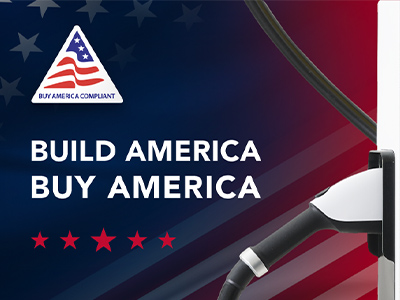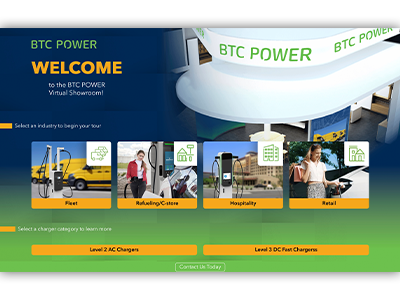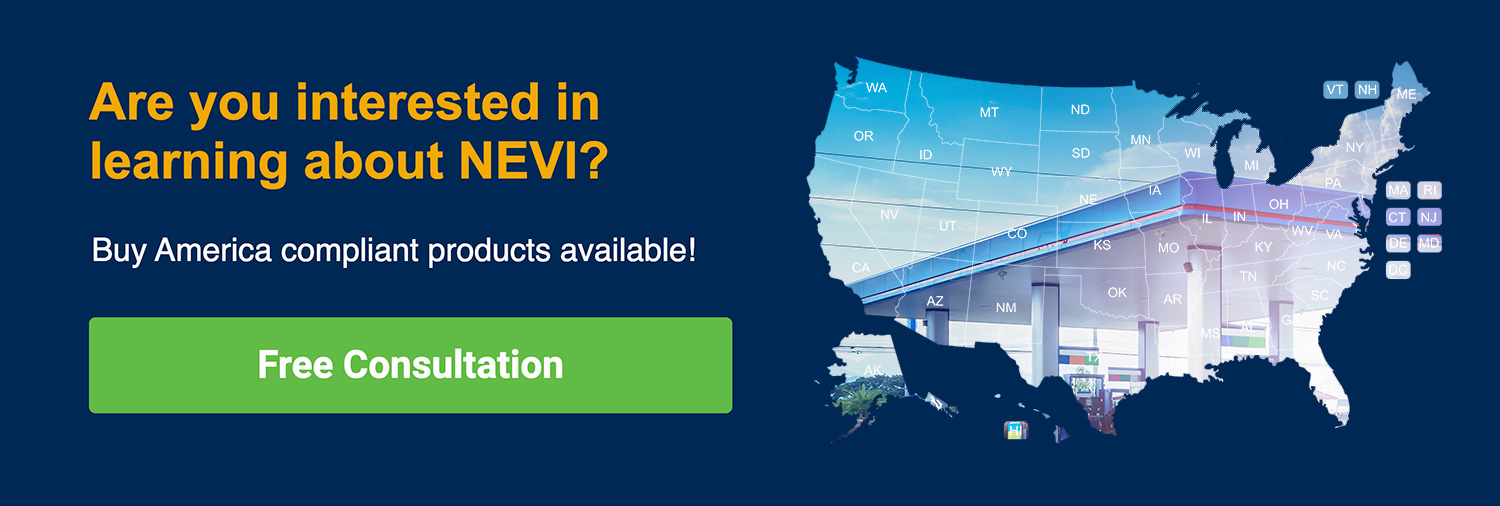
When federal funding dollars flow into infrastructure projects, they come with strings attached that lead directly back to American businesses and manufacturers. Depending on the organization installing electric vehicle infrastructure, there is a powerful mandate derived from a policy called the Buy America Act, which places restrictions on EV charger installation purchases.
What is Buy America?
The Build America, Buy America Act (BABA), enacted as part of the Infrastructure Investment and Jobs Act in 2021, established a domestic content procurement preference for all federal financial assistance obligated for infrastructure projects after May 14, 2022. The BABA requirements for iron, steel, manufactured products, and construction materials bolster domestic manufacturing, build more stable supply chains, and support the local labor market.
Government agencies utilizing federal funding must comply with Buy America due to federal legislation mandating domestic content in infrastructure projects funded by federal financial assistance. The law exists for a fundamental reason: it is designed to help bolster a resilient domestic supply chain and provide a secure manufacturing supply for critical materials, for both emerging and existing industries in the United States. These government agencies would include:
- Federal
- State and local
- Public educational districts or institutions
- Public transit agencies
- Other entities such as:
- Public utilities
- Tribal governments
- Nonprofits receiving federal infrastructure assistance
- Public housing authorities
- Publicly funded hospitals and medical centers

Virtual Showroom
See all BTC POWER EV Chargers
Is There a Waiver of Buy America Requirements for EV chargers?
At one time, there was, but it was temporary and strategic. The Federal Highway Administration (FHWA) established a temporary public interest waiver for steel, iron, manufactured products, and construction materials in EV charger infrastructure. This enables EV charger acquisition and installation to proceed immediately while phasing out the waiver over time. However, that waiver period, or Phase 1, has ended.
- Phase 1 (March 23, 2023 – July 1, 2024): The waiver applies to all EV chargers manufactured before July 1, 2024, with final assembly in the United States and installation begun by October 1, 2024.
- Phase 2 (July 1, 2024 onward): FHWA requires that the cost of components manufactured domestically for EV charging equipment must meet at least 55 percent domestic content for manufactured products, with final assembly occurring in the United States.
What are the Buy America Requirements for EV Chargers?
The requirements create a clear roadmap for domestic content:
- Component Manufacturing: A component is manufactured in the United States if all manufacturing processes occur domestically. Any manufacturing process outside the United States disqualifies the component.
- Final Assembly: All qualifying EV chargers must have final assembly in the United States.
- Housing Exception: EV charger housing components that are predominantly steel and iron must meet current FHWA Buy America requirements and are excluded from the waiver.
- 55% Domestic Content: Starting July 1, 2024, at least 55% of component costs must be from U.S. manufacturing, excluding labor costs for final assembly.
EV Charger Federal Funding Sources Driving Compliance
Multiple federal funding streams are accelerating EV infrastructure deployment while reinforcing Buy America requirements:
National Electric Vehicle Infrastructure (NEVI) Formula Program:
FHWA’s NEVI program was created to provide $5 billion to States, D.C., and Puerto Rico over five years (FY 2022-2026) to strategically deploy EV chargers and establish an interconnected network. Funding covers up to 80% of eligible project costs. Funding from this program has changed a few times due to administrative preferences.
Charging and Fueling Infrastructure (CFI) Program:
The Discretionary Grant Program was designed to create $2.5 billion for community and corridor charging infrastructure, with community and corridor two separate tracks within this program.
Additional Programs:
The Infrastructure Investment and Jobs Act makes EV charging infrastructure eligible under the Surface Transportation Block Grant program and provides funding for electric school buses, port electrification, and battery production.
Strategic Advantages Through EV Charger Cooperative Purchasing
Navigating Buy America compliance becomes significantly easier when organizations leverage cooperative purchasing power. BTC POWER participates in buying cooperatives that streamline the procurement process for both public agencies and private organizations.
Cooperative purchasing enables multiple organizations to consolidate their purchasing power and select goods and services from pre-approved vendors, thereby saving money, time, and resources. BTCP is a 791 Co-op-approved vendor, adding efficiency to your federal bidding process.
The cooperative model provides substantial benefits:
- Streamlined Compliance: The 791 Purchasing Cooperative contains contractors that meet all state and federal competitive bidding requirements, slashing red tape that causes project delays.
- Cost Effectiveness: Cooperative members can directly place orders with approved vendors to bypass the bidding process while maintaining competitiveness.
- Proven Results: As one example, the Petaluma School District leveraged the 791 Purchasing Cooperative to contract with BTC POWER for cost-effective access to cutting-edge charging technology while aligning with sustainability goals.
Manufacturing Compliance and Market Impact
The transition to Buy America compliance is reshaping the commercial EV charger industry. U.S. manufacturing capabilities at BTC POWER, for example, comply with “Buy America” standards established by the Federal Highway Administration, Federal Transit Administration and Infrastructure Investment and Jobs Act.
BTC POWER had a head start focusing on its Buy America compliance as one of the industry’s leading EV charger manufacturers that established its business more than two decades ago. This establishment and experience within the EV charging space mean that the EV charging industry does not need to be built from scratch; it already exists.
Buy America Compliance Looking Forward
As the EV charging network expands, Buy America requirements will continue shaping the landscape. For organizations planning EV infrastructure projects, understanding Buy America compliance is foundational. The requirements represent more than regulatory hurdles; they’re investments in American manufacturing capability, supply chain resilience, and economic security.
The convergence of federal funding, domestic content requirements, and cooperative purchasing creates opportunities for strategic EV charger infrastructure development, making it a viable possibility for government agencies and organizations.
For organizations navigating Buy America compliance, BTC POWER’s Gen 4 All-in-One chargers and L2 MaX series deliver NEVI-compliant solutions manufactured to federal standards. Contact BTC POWER to get started on your Buy America-compliant EV charging systems.


